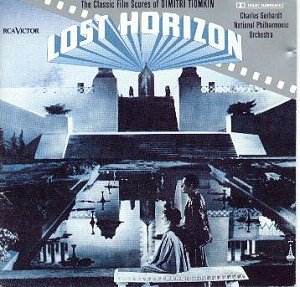| **************************************************************
EDITOR'S RECOMMENDATION
************************************************************** |
Dimitri TIOMKIN Lost
Horizon. The Guns of Navarone. The Big Sky. The Fourposter.
Friendly Persuasion. Search for
Paradise.  Charles
Gerhardt conducting the Ntaional Philharmonic
Orchestra.
Charles
Gerhardt conducting the Ntaional Philharmonic
Orchestra.  RCA Victor
GD81669
RCA Victor
GD81669

This Classic 1976 recording was later reissued on
CD.Note: Although this recording is not available at
the moment, persisitent searching of record stores and second hand dealers
is strongly recommended and could be fruitful
This is one of the best of RCA's 1970s Classic Film Scores
series with Charles Gerhardt conducting the National Philharmonic Orchestra,
the members of which were specially selected from amongst the finest players
of London's orchestras. The series was engineered by Kenneth Wilkinson and
recorded in the marvellous acoustic of London's Kingsway Hall. Dimitri Tiomkin,
himself, was in attendance, and took an active interest in the recording
sessions for this album.
The major item is the 23-minute suite from the 1937 Frank Capra
classic for Columbia, Lost Horizon, from James Hilton's celebrated
novel about an idyllic civilisation, a paradise, hidden in a remote Tibetan
valley. It was Tiomkin's first major film score. Hollywood. Max Steiner,
on loan to Columbia, conducted the score for the film.
The suite opens in great epic sweep with a Prologue that includes
a few bars of the love theme and that wonderful, extraordinary music representing
Shangri-La which has an affinity with Oriental or medieval monody to give
a timeless but infinitely serene quality. But then the music erupts into
turbulence for `Riot in Baskul' and the `Mob Scene at the Refuelling Station'.
Wild exotic choral and orchestral music recalls Borodin, in PrinceIgor
mode, as the hijacked plane lands in the middle of nowhere to be refuelled
by a swarm of bearded and turbaned tribesman.
After the plane crashes on the vast Tibetan plateau, Chang's
caravan escorts the plane's passenger's over storm-swept mountain country
to dour, nasal woodwinds. The music marches slowly and wearily working to
a huge crescendo that suddenly evaporates. Only distant chiming bells and
voices are heard as the travellers come in sight of the Celestial City, "a
cloistered Eden where people live to unheard-of ages". The following tracks
are concerned with the peace and serenity of life in the beautiful surroundings
Shangri-La. A lovely nocturne, that embraces the love theme, is followed
by evocative sequences: the (horse) `Riding Sequence', `The Waterfall' and
`Chinese Children's Scherzo'.
But the high point of the score is reached with the `Bell Sequence'
and `Funeral Cortege of the High Lama'. The long winding Shangri-La theme
is projected against a kaleidoscopically changing background of harmony and
orchestral-choral colour. The huge percussion section (reasembling the Javanese
gamelan or percussion orchestra) includes: xylophone, vibraphone, marimba,
five glockenspiels, three sets of tubular bells, two sets of the very large
Parsifal chimes, a set of tuned cymbals, four tuned Tibetan gongs,
three tamtams of different sizes and a Tibetan instrument known as the rata
drum.
The brief 2½-minute Prelude to The Guns of
Navarone is worth the price of this album alone. This performance,
of one of the most thrilling pieces of music ever penned by Tiomkin, has
all the bite and attack that is missing from the rival Citadel (formerly
on Unicorn-Kanchana) recording also reviewed this month.
Beginning and ending quietly The Big Sky is an
unusual western score. Howard Hawkes's 1952 film (Tiomkin also scored Hawkes
Red River and Rio Bravo), was set along the Missouri River,
in the 1830s, a somewhat earlier period than the majority of western adventures.
It concerned the lives of the early settlers, trappers and Indians. Tiomkin's
music is often idyllic, a vivid sound painting of the beautiful wooded and
mountainous countryside. The `Indian' figures are treated with the utmost
sympathy and subtlety. `Forest at Night' is "an atmospheric nocturne with
cloudy, impressionistic textures and solo trumpet and horn each merging
momentarily from the gloom-coloured shadows; the rhythmic mutter of tom-toms
is heard and the night grows into a love theme" -- one of Tiomkin's most
haunting love themes.
People who have contributed to our debate on Tiomkin have remarked
about the difficulty of Tiomkin's scores. The sparkling, quicksilver
high-spirited Overture to TheFourposter is a perfect example. This
little piece may sound carefree but its cross-rhythms, rapidly fluctuating
tempi and extraordinary instrumental demands such as high violin harmonics
are a great challenge to both orchestra and conductor. This track, the whole
album indeed the whole RCA Classic Film Score series is a tribute to the
remarkable, skills and dedication of Charles Gerhardt.
The 1956 film, Friendly Persuasion was set in an Indiana
Quaker community at the time of the Civil War. Starring Gary Cooper and Dorothy
McGuire, it was, for the most part, an idyllic western. The big hit from
the film was the title song (aka `Thee I Love'). Jess (Cooper), in
his love of music, has purchased an organ, scandalising his wife Eliza (McGuire)
who rushes off in a huff to the barn where Jess follows her. Magically, in
this celebrated scene, Tiomkin holds back only allowing fragments of his
beautiful melody to float as Jess quietly coaxes Eliza round, the music cleverly
pointing their conversation with many changes of mood. At length the big
romantic theme is allowed through as domestic harmony is re-established.
The album alas ends in something of a downbeat with the, in
my opinion, bordering-on-the-banal, Choral Finale for the Cinerama production,
Search for Paradise.
Notwithstanding the short final item, this is a compulsory
purchase for Tiomkin fans
Reviewer
Ian Lace
